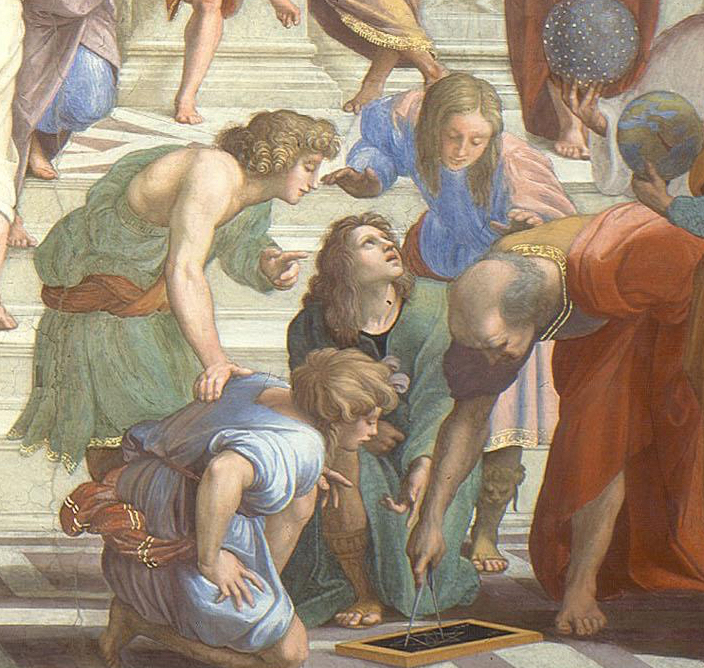Against a gold mosaic-like background the spirit of divinity points to the Disputa scene below. The two putti hold inscriptions that might be translated as "Knowledge of Divine Matters."
The Italian word disputa has unfortunately been translated into English as dispute, suggesting argument, contention, and quarrel. The more probable meaning of disputa here is discussion, deriving ultimately from the Latin disputare, “to reckon.”
The central "discussion" in the Disputa mirrors the interaction between Plato and Aristotle across the room in The School of Athens.
Unlike the interior setting of The School Athens, the Disputa takes place in two realms: the divine in heaven (with the clouds mirroring the cloud of the seated Divinity in the tondo above), and the earthly outdoors scene with a city and landscape in the distance.
(Click the image for a lightbox view)
The Gathering in Heaven
(Click the image for a lightbox view)
In the top section of the Disputa panel, god the Father presides over the seated Christ surrounded by a radiant, sacred light. On his right, Christ’s mother inclines her body in a respectful and loving gesture towards her son. On his left, John the Baptist points towards the savior — a gesture that parallels the gesture of the theologian directly below him.
At the bottom of the scene, the Dove of the Holy Spirit descends to earth, bringing putti with the gospels of Matthew, Mark, Luke and John — works that will bring heavenly salvation to the world below.
The Meaning of the Eucharist
(Click the image for a lightbox view)
In the scene below, the monstrance (a vessel for bearing the Eucharist) unites the aureole of Christ above with the theological exchange below.
The discussion is led by the original Four Doctors of the Church (Pope Gregory I and Saint Jerome on the left, Saint Augustine and Saint Ambrose on the right), with many other important religious figures in the group such as Savonarola, Dante, Pope Sixtus IV and Pope Julius II (who commissioned the Stanza della Segnatura).
The Books of the Disputa and the School of Athens
The book on the left is a commentary on the Book of Job written by Pope Gregory I. The volume on the right is Augustine's City of God. Each volume can be seen as the Christian parallel to the works in the School of Athens: Arisotle's Ethics and Plato's Timaeus.
Click the image to visit a page with over fifty details of images from the Disputation:















